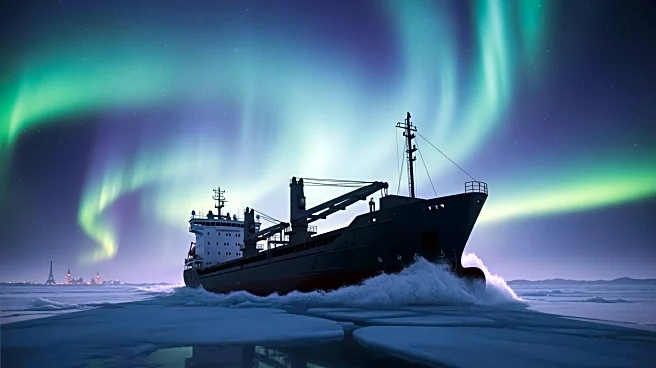What's Happening?
A Chinese container ship, the Istanbul Bridge, has successfully completed a pioneering journey through the Arctic to a UK port, as reported by Xinhua. This voyage significantly reduced the transit time
for goods such as electric vehicles and solar panels destined for Europe. Originally expected to take 18 days, the journey was delayed by two days due to a storm off the coast of Norway but still arrived earlier than the typical 40 to 50 days required via the Suez Canal or Cape of Good Hope. The Northern Sea Route, which runs entirely through Arctic waters within Russia's exclusive economic zone, has become navigable due to global warming. This development is part of China's strategy to establish faster maritime links with the European Union amidst a trade war with the United States.
Why It's Important?
The successful Arctic voyage marks a significant shift in global trade dynamics, offering China a faster and potentially more cost-effective route to Europe. This is crucial as China seeks to diversify its export markets to sustain economic growth, especially given the decline in exports to the U.S. amid ongoing trade tensions. The Arctic route could reduce China's reliance on traditional shipping lanes like the Strait of Malacca, which are vulnerable to geopolitical risks. The voyage also underscores the impact of climate change on global shipping routes, as melting Arctic ice opens new pathways for commercial shipping.
What's Next?
China's exploration of the Arctic route is likely to continue, potentially increasing maritime cooperation with Russia. This could lead to more frequent use of the Northern Sea Route, further altering global shipping patterns. Stakeholders in the shipping industry may need to adapt to these changes, considering the unpredictable weather and sailing conditions in the Arctic. Additionally, the geopolitical implications of increased Arctic shipping could prompt discussions among international bodies regarding environmental and territorial concerns.
Beyond the Headlines
The opening of the Arctic route raises ethical and environmental questions about the impact of increased shipping traffic on the fragile Arctic ecosystem. As global warming continues to reduce sea ice, the long-term consequences for Arctic wildlife and indigenous communities could be profound. Furthermore, the strategic use of Arctic waters by major powers like China and Russia may lead to new geopolitical tensions, as nations vie for control over these emerging trade routes.









